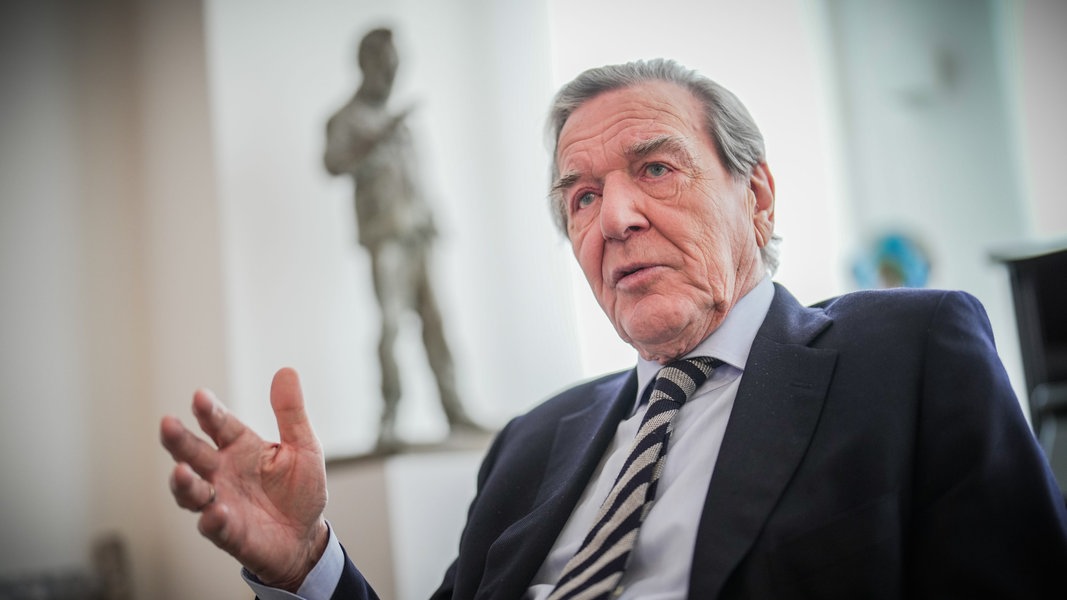Burnout Bei Gerhard Schröder: Hintergründe Und Reaktionen

Burnout Bei Gerhard Schröder: Hintergründe Und Reaktionen. Discover more detailed and exciting information on our website. Click the link below to start your adventure: Visit Best Website. Don't miss out!
Table of Contents
Burnout bei Gerhard Schröder: Hintergründe und Reaktionen – Ein Ex-Kanzler am Limit?
Germany is buzzing with speculation: Former Chancellor Gerhard Schröder, a figure synonymous with German politics for decades, is reportedly facing burnout. This news has sent shockwaves through the nation, sparking intense debate about the pressures of high office and the importance of mental health, even for the most powerful individuals. This article delves into the reported burnout of Gerhard Schröder, exploring potential contributing factors, public reactions, and the broader implications of this development.
The Whispers of Exhaustion: Potential Causes of Schröder's Burnout
While official confirmation regarding Schröder's health remains elusive, numerous sources suggest a significant decline in his well-being. Several factors could be contributing to this reported burnout:
-
The weight of political legacy: Schröder's time as Chancellor was marked by significant reforms and considerable controversy. The long-term effects of navigating such intense political pressure could be taking their toll. His continued involvement in business, particularly his controversial ties to Russia, have undoubtedly added to his stress levels.
-
Public criticism and scrutiny: Schröder remains a highly visible figure, facing relentless public scrutiny, especially concerning his post-chancellorship activities and his relationship with Russia. This constant barrage of criticism can significantly contribute to mental health issues.
-
Age and health factors: While not explicitly stated, age is a significant factor influencing one's resilience to stress. The cumulative effect of a long and demanding career could be exacerbating any existing health concerns.
-
The pressure of high-profile roles: The transition from the intense pressure of high office to a less structured, yet still highly public life, can be particularly challenging. Maintaining a public image, whilst navigating complex business relationships, is undeniably stressful.
Public Reactions and the Importance of Mental Health
The news of Schröder's potential burnout has prompted a wave of diverse reactions:
-
Sympathy and concern: Many have expressed sympathy, emphasizing the importance of prioritizing mental health regardless of social standing or past achievements. The conversation around burnout is gaining traction, highlighting the need for better understanding and support.
-
Criticism and skepticism: Others remain critical of Schröder's actions and his continued association with controversial figures and entities. Some argue that his public image and actions have contributed to the current situation.
-
Calls for greater transparency: The lack of official confirmation regarding Schröder's health has fueled calls for greater transparency. Many believe that public figures should be more open about their struggles with mental health to reduce stigma and encourage others to seek help.
The Broader Implications: A Lesson for Leaders?
Schröder's reported burnout offers a crucial lesson: even the most powerful individuals are vulnerable to the debilitating effects of stress and pressure. This highlights the need for:
-
Better support systems for leaders: High-pressure positions require robust support networks to prevent burnout. This could involve access to mental health professionals, stress management programs, and a culture that prioritizes well-being.
-
Open dialogue about mental health: Reducing the stigma surrounding mental health is critical. Open discussions about stress, burnout, and seeking professional help are essential to creating a healthier society.
-
A more balanced approach to public life: The constant scrutiny and pressure faced by public figures need to be re-evaluated. A healthier balance between public life and personal well-being is essential for sustained success and mental health.
In conclusion, the reported burnout of Gerhard Schröder is not merely a personal matter; it's a significant event with broader implications. It serves as a reminder of the human cost of power and the crucial need for open conversations about mental health and well-being, particularly for individuals in high-pressure positions. Let's hope for a swift recovery for Mr. Schröder and a renewed national conversation about the importance of mental wellness. What are your thoughts on this developing situation? Share your comments below.

Thank you for visiting our website wich cover about Burnout Bei Gerhard Schröder: Hintergründe Und Reaktionen. We hope the information provided has been useful to you. Feel free to contact us if you have any questions or need further assistance. See you next time and dont miss to bookmark.
Featured Posts
-
 Revit 2025 Autodesks Rsa Roadmap And What It Means For You
Feb 05, 2025
Revit 2025 Autodesks Rsa Roadmap And What It Means For You
Feb 05, 2025 -
 Solve Wordle 1326 Clues And The Answer Revealed
Feb 05, 2025
Solve Wordle 1326 Clues And The Answer Revealed
Feb 05, 2025 -
 Chelsea Edge Past West Ham 2 1 Victory Highlights
Feb 05, 2025
Chelsea Edge Past West Ham 2 1 Victory Highlights
Feb 05, 2025 -
 Mad The World Examining Causes Of Widespread Social Unrest
Feb 05, 2025
Mad The World Examining Causes Of Widespread Social Unrest
Feb 05, 2025 -
 Is Bonk Io Dying A Look At Player Numbers And Future Updates
Feb 05, 2025
Is Bonk Io Dying A Look At Player Numbers And Future Updates
Feb 05, 2025
